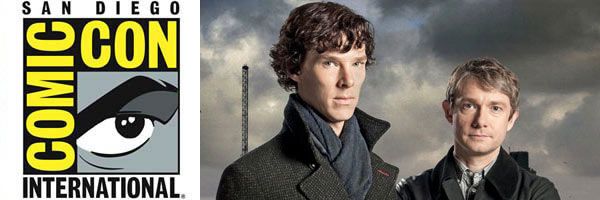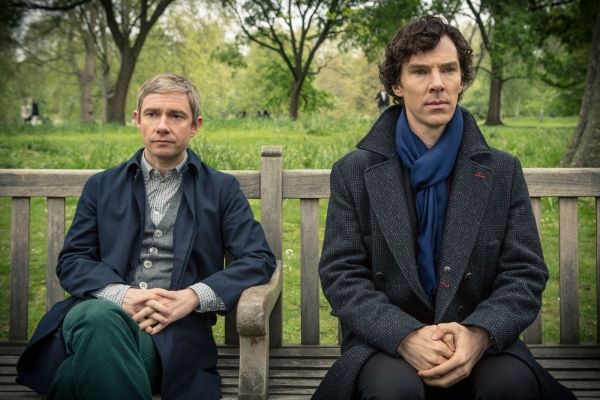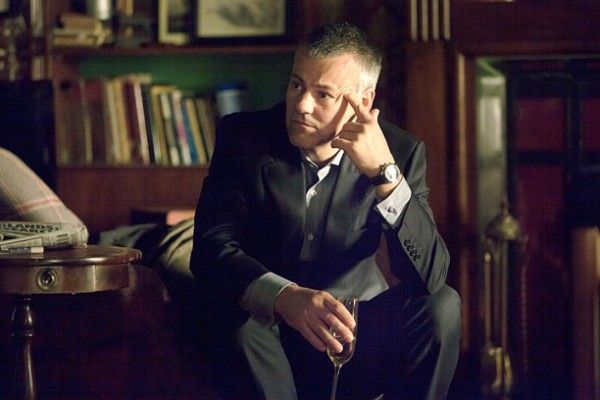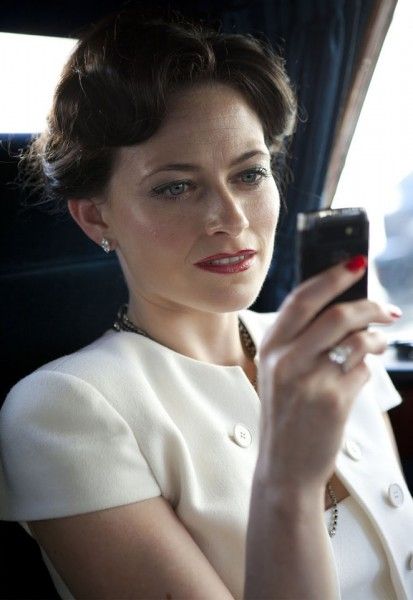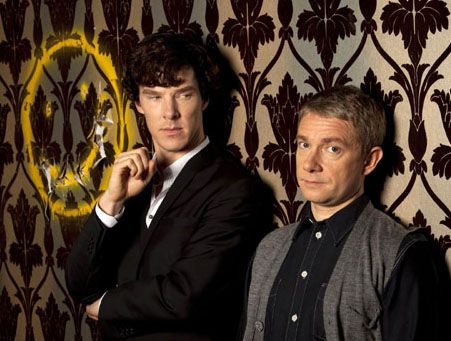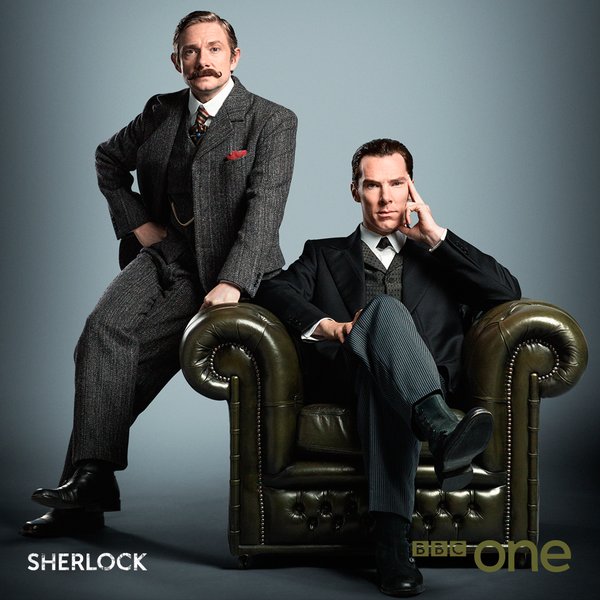Even for the BBC, a channel with no shortage of inspired and timeless programming, Steven Moffat and Mark Gatiss’s Sherlock has been a unique triumph of mystery-centric television, with a consistently moving and involving undercurrent of witty drama. At the center of it all, as always, is the relationship between Sherlock Holmes and John H. Watson, the greatest detective of all time and his ever-wise, insightful partner, and the chemistry between stars Benedict Cumberbatch and Martin Freeman has been a major drawing point for all three series of the program, which capped off its best series to date last year. So, its understandable that at the Sherlock Comic-Con panel, moderated by Sandra Gonzalez and featuring Moffat, executive producer Sue Vertue, and co-star Rupert Graves, who plays DI Greg Lestrade, the big questions surrounded the impending Victorian Special and Series 4, which all three were quick to say was a long, long way off.
Gonzalez did an admirable job of trying to squeeze details for future incarnations of the series from the famously prickly and tight-lipped Moffatt, who dominated the panel for the most part, but the panel was most memorable for Moffat’s unimpeachable sense of humor, and a fanatical love for the details of Sir Arthur Conan Doyle’s original stories. Handling questions from Gonzalez and the audience, Moffatt, along with Graves and Vertue, proved largely self-effacing but not without adding some major tidbits about the process of creating the show, the series’ cast, and the production of the Victorian Special, which looks to premiere this winter. Check out the full recap below.
Panel Highlights
- Moffatt and Vertue started off by revealing that the Victorian Special will be released in select cinemas upon its proper release later this year. Moffatt was quick to point out how great the show looked on the big screen.
-
Moffat said he thinks the Victorian Special is “one of the best” they’ve done thus far, going on to call it “terrific.”
- Graves revealed that, though he didn’t appear in the clip, Lestrad will be in the Victorian Special and will be wearing mutton chops, which he referred to as “hedges.”
- Moffatt insisted that the Victorian Special “has to be a standalone” episode of the show, rather than trying to work it into the show’s modern trappings.
- At one point, Graves referred to a part of the production process as the “same shit,” only to then read a warning that there were children under 18 in the audience.
- Speaking about the Victorian Special, Moffatt was quick to point out that it takes place in a “sexist” era and that in Doyle’s story, “women don’t speak.” He then said that these elements will be crucial to the story in the Victorian Special.
- Talking about his writing process, Moffatt was quick to point out that he never has an “oh I’m good” moment, and that most of the time he feels “haunted and miserable.”
- Moffatt opined that being a big fan of the show makes certain people “too obsessed to enjoy” Sherlock in a pure way, and related it to his feelings on the initial runs of Dr. Who.
- When talking about filming the Victorian Special, Vertue was quick to say that it was “harder to shoot” than the more modern episodes. She also said that they had their extras “walk faster” to avoid the episode feeling rote or stagnant.
-
When discussing the physical nuances of the show, Moffatt said that they are almost never scripted, and that the comedy of the show always comes from the reactions.
- Vertue admitted that she loves “Rupert’s mugging” when reacting to what Sherlock does and says
- Graves admitted that one of his favorite moments was the “oh, you bastard” hug at the beginning of Series 3, when Lestrad finds out Holmes is still alive.
- When asked about her favorite gut-punch moment, Vertue chose the end of Series 3, specifically the look on Grattis’s Mycroft’s face when his brother has a cadre of guns pointed at him.
- Moffatt didn’t have a favorite gut-punch moment, but said he only really felt clever and thought a line was “not bad” was “I am Sherlocked.”
- Graves said that his favorite gut-punch moment was “Mary with the gun.”
- Talking about how he constructs the drama and mystery of the show, Moffatt emphasized the “backswing” and the “I should have seen it coming!” feeling that the show often gives off. He specifically referenced Sherlock’s relationship with Mary.
- Moffatt admitted that he reads the “stage directions” at the table reads.
Footage
Before the questions even started, however, the panel showed a special message from Andrew Scott, Jim Moriarity himself, who hilariously feigned reading a “Spekter 007” script – he will appear in the upcoming Spectre – before getting a call from “Ben.” Playing off the grand tradition of a distinctly English preference for the stage over the screen, Cumberbatch humble-bragged about appearing in Hamlet on the London stage, before Mark Gatiss joined the conversation to say he’s similarly appearing in a major stage production. The crowd erupted when the clip cut to Cumberbatch going over the “per chance to dream” speech, with Gatiss eventually joining him on screen. The clips ended with Scott chowing down hot nuts, before concluding with a Moriarity-toned “Miss me?” that sent the whole of Ballroom 20 into hysterics.
Trailer
The very short clip from the Victorian Special opens on a bustling, snowy Baker Street and we quickly focus on 221b. The production, as one would expect from this series, is stellar, and its clear the crew took great care in getting the visual details of the Victorian era correct. Una Stubbs’s Ms. Hudson opens the door as Sherlock and Watson show up in a carriage, having just come back from cleaning up a dismembered country squire. There’s a humorous bit involving a young child asking after what Watson has in the bags, which would seemingly be the squire.
Once we get into 221b, Ms. Hudson admits that she never really cared to read Watson’s stories about Sherlock’s adventures, which spurs Sherlock to insult Watson’s intelligence. It’s a classic set-up for Steven Moffat and Mark Gatiss’s version of the Sherlock Holmes legend, and the actors seem as comfortable and quick as ever trading questions and insults, both intended and not. The clip ended with Watson, insulted, seeking confirmation that at the very least, The Hound of the Baskervilles was worth his time and effort. Martin Freeman’s delivery and reactions to the conversation suggest that the change in scenery hasn’t changed his relationship to either Sherlock or Ms. Hudson. Now, we must wait for the rest.
Audience Q&A
- When asked about worries about running out of story material, Moffatt said that they’ve only really done 10 out of the 60 stories and that “old age and death” would likely come before they got around to all the stories. He also said that he considers the stories “sort of new” since he often melds details and elements from different stories in a single episode.
-
On the possibility of the reappearance of Irene, Moffatt said he wasn’t sure if she would return but that he had written a version of Irene and Sherlock’s night together where she stole all of his clothes to escape her pursuers. He did say he likes the idea of Sherlock and Irene smiling “once a day when they think of one another.”
- When answering a question about the draw of the show, Moffatt emphasized the timeless appeal of a man who “understands everything but himself” and the “freak genius,” but finally laid the reasoning on the unique chemistry of Cumberbatch and Freeman.
- Moffatt was winkingly quiet when asked about the third Holmes brother that Mycroft references early in the series.
- When discussing the details of adaptation – including the usage of Watson’s middle name, Hamish, as a nod to Doyle’s lack of continuity in the stories – Moffatt threw up his arms and said “we really care about things grown ups shouldn’t care about.”
- Moffatt said that comments from Dr. Who scribe Paul Cornell caused them to rewrite parts of the Series 2 finale, “The Reichenbach Fall,” involving the kidnapped children.
- “I like Sherlock losing” Moffatt said when asked about what type of stories he prefers to write for his main character, saying he’ll have to get around to a story where he “wins properly” despite enjoying when the character’s “supreme reason doesn’t work.”
- Vertue said that, when it comes to story, they “solve the problems in the script,” which caused Moffatt to reiterate the importance of melding story elements. He especially emphasized the use of the opening in “His Last Vow,” which was borrowed from an entirely different story, “The Man with the Twisted Lip.”
- Moffatt was quick to dismiss the idea of him “evolving as a writer” when asked about how he’s grown as the series has gone on, admitting that once he watches an episode for the first time, “I don’t want to watch it again.”
-
When asked about the possibility of a World Tour, not unlike what Dr. Who has done, Vertue seemed interested but unknowledgeable as to the logistics of such a tour.
- Moffatt said that the decision to write Lestrad as a “good copper,” when he’s often an “aggressive idiot” in the books, came largely from Graves portrayal and his “handsome” looks.
- When asked about issues of continuity, Moffatt admitted to have drawing an image of Sherlock chasing a Dalek from Dr. Who, which his son “added obscenities” to.
- Vertue said that the production team and the BBC are working to make the UK and US releases of the series closer together in the future.
- Moffatt consistently confused a scarf wrapped around the microphone as one being worn by seemingly everyone who asked questions.
- Moffatt admitted to shooting a short film in college on 8mm where his sister played both Sherlock and Dr. Who, and that he still has the film at his home.
- When asked about the producers’ role in the upcoming restoration of the 1916 silent film adaptation of Sherlock Holmes, starring William Gillette, Moffatt admitted that he hadn’t seen the restoration in full yet but that Gilette’s portrayal was influential to the modern concept of Sherlock.
- When asked about Sherlock’s attractiveness, Moffatt said he thinks that Benedict Cumberbatch is “not as handsome as [Graves].”

